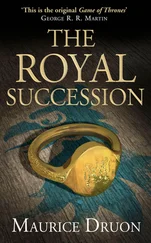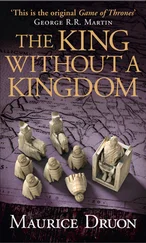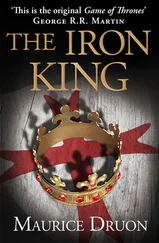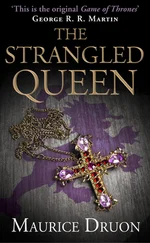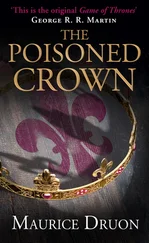Maurice Druon - The She-Wolf
Здесь есть возможность читать онлайн «Maurice Druon - The She-Wolf» — ознакомительный отрывок электронной книги совершенно бесплатно, а после прочтения отрывка купить полную версию. В некоторых случаях можно слушать аудио, скачать через торрент в формате fb2 и присутствует краткое содержание. Жанр: unrecognised, на английском языке. Описание произведения, (предисловие) а так же отзывы посетителей доступны на портале библиотеки ЛибКат.
- Название:The She-Wolf
- Автор:
- Жанр:
- Год:неизвестен
- ISBN:нет данных
- Рейтинг книги:5 / 5. Голосов: 1
-
Избранное:Добавить в избранное
- Отзывы:
-
Ваша оценка:
- 100
- 1
- 2
- 3
- 4
- 5
The She-Wolf: краткое содержание, описание и аннотация
Предлагаем к чтению аннотацию, описание, краткое содержание или предисловие (зависит от того, что написал сам автор книги «The She-Wolf»). Если вы не нашли необходимую информацию о книге — напишите в комментариях, мы постараемся отыскать её.
The She-Wolf — читать онлайн ознакомительный отрывок
Ниже представлен текст книги, разбитый по страницам. Система сохранения места последней прочитанной страницы, позволяет с удобством читать онлайн бесплатно книгу «The She-Wolf», без необходимости каждый раз заново искать на чём Вы остановились. Поставьте закладку, и сможете в любой момент перейти на страницу, на которой закончили чтение.
Интервал:
Закладка:
Henry of Leicester shook his great, crippled head; it was hardly a courteous way of reminding him of the death of his brother, Thomas of Lancaster, who had been beheaded sixteen months before, when twenty great lords had been hanged and as many more imprisoned.
‘Indeed, Sire my Husband, we have all noticed that the only battles you can win are against your own barons,’ Isabella said.
Once again Edward looked at her with hatred in his eyes. ‘What courage,’ Bouville thought, ‘what courage this noble Queen has!’
‘Nor is it altogether fair,’ she went on, ‘to say that they rebelled against you because they hold their rights by their swords. Was it not rather over the rights of the county of Gloucester which you wanted to give to Sir Hugh?’
The two Despensers drew closer together as if to make common front. Lady Despenser, the younger, sat up stiffly at the chess-board. She was the daughter of the late Earl of Gloucester. Edward II stamped his foot on the flagstones. Really, the Queen was impossible. She never opened her mouth except to tease him with his errors and mistakes of government. 8
‘I give the great fiefs to whom I will, Madame. I give them to those who love me and serve me,’ Edward cried, putting his hand on the younger Hugh’s shoulder. ‘On whom else can I rely? Where are my allies? What help, Madame, does your brother of France, who should behave to me as if he were mine, since after all it was in that hope I was persuaded to take you for wife, bring me? He demands that I go and pay him homage for Aquitaine, and that is all the help I get from him. And where does he send me his summons, to Guyenne? Not at all. He has it brought to me here in my Kingdom, as if he were contemptuous of feudal custom, or wished to offend me. One might almost think he believed himself also suzerain of England. Besides, I have paid this homage, indeed I have paid it too often, once to your father, when I was nearly burnt alive in the fire at Maubuisson, and then again to your brother Philippe, three years ago, when I went to Amiens. Considering the frequency with which the kings of your family die, Madame, I shall soon have to go to live on the Continent.’
The lords, bishops, and Yorkshire notables, who were standing at the back of the room, looked at each other, by no means afraid, but shocked rather at this impotent anger which strayed so far from its object, and revealed to them not only the difficulties of the kingdom, but also the character of the King. Was this the sovereign who asked them for subsidies for his Treasury, to whom they owed obedience in everything, and for whom they were to risk their lives when he summoned them to take part in his wars? Lord Mortimer must have had good reasons for rebellion.
Even the intimate councillors seemed ill at ease, though they well knew the King’s habit of recapitulating, even in his correspondence, all the troubles of his reign whenever a new difficulty arose.
Chancellor Baldock was mechanically rubbing his Adam’s apple above his archidiaconal robe. The Bishop of Exeter, the Lord Treasurer, was nervously biting his thumbnail and watching his neighbours out of the corner of his eye. Only Hugh Despenser the Younger, too curled, scented and overdressed for a man of thirty-three, showed satisfaction. The King’s hand resting on his shoulder made it clear to everyone how important and powerful he was.
He had a short, snub nose and a well-shaped mouth and was now raising and lowering his chin like a horse pawing the ground, as he approved every word Edward said with a little throaty murmur. His expression seemed to imply: ‘This time things have really gone too far; we shall have to take stern measures!’ He was thin, tall, rather narrow-chested and had a bad, spotty skin.
‘Messire de Bouville,’ King Edward said suddenly, turning to the ambassador, ‘you will reply to Monseigneur of Valois that the marriage he proposes, and of which we appreciate the honour, will most certainly not take place. We have other views for our eldest son. And we shall thus put a term to the deplorable custom by which the Kings of England take their wives from France, without ever deriving any benefit from it.’
Fat Bouville paled at the affront and bowed. He looked sadly at the Queen and went out.
The first and most unexpected consequence of Roger Mortimer’s escape was that the King of England was breaking his traditional alliance. By this outburst he had wanted to wound his wife; but he had also succeeded in wounding his half-brothers of Norfolk and Kent, whose mother was French. The two young men turned to their cousin Crouchback, who shrugged his heavy shoulder in resigned indifference. Without reflection, the King had casually alienated for ever the powerful Count of Valois who, as everyone knew, governed France in the name of his nephew Charles the Fair. Caprices such as this have sometimes lost kings both their thrones and their lives.
Young Prince Edward, still motionless by the window, was silently watching his mother and judging his father. After all, it was his marriage that was being discussed and he was allowed to have no say in it. But if he had been asked to choose between his English and French blood, he would have shown a preference for the latter.
The three younger children had stopped playing: the Queen signed to the maidservants to take them away.
And then, with the greatest calm, looking the King straight in the eye, she said: ‘When a husband hates his wife it is natural he should hold her responsible for everything.’
Edward was not the man to make a direct answer to that.
‘My whole Tower guard dead-drunk,’ he cried, ‘the Lieutenant in flight with that felon, and my Constable sick to death with the drug they gave him. Unless the traitor’s malingering to avoid the punishment he deserves. It was up to him to see my prisoner did not escape. Do you hear, Winchester?’
Hugh Despenser the Elder, who had been responsible for the appointment of Constable Seagrave, bowed to the storm. He was thin and narrow-shouldered, with a stoop that was in part natural and in part acquired during a long career as a courtier. His enemies had nicknamed him ‘the weasel’. Cupidity, envy, meanness, self-seeking, deceit, and all the gratifications these vices can procure for their possessor were manifest in the lines of his face and beneath his red eyelids. And yet he was not lacking in courage; but he had human feelings only for his son and a few rare friends, of which Seagrave indeed was one. You could better understand the son’s character when you had observed the father for a moment.
‘My lord,’ he said in a calm voice, ‘I feel sure that Seagrave is in no way to blame.’
‘He’s to blame for negligence and laziness; he’s to blame for allowing himself to be made a fool of; he’s to blame for not suspecting that a plot was being hatched under his nose; he’s to blame perhaps for his bad luck. And I never forgive bad luck. Though Seagrave is one of your protégés, Winchester, he shall be punished; and people will no longer be able to say that I’m unfair and that my favours are lavished only on your creatures. Seagrave will take Mortimer’s place in prison; and perhaps his successor will take care to keep a better watch. That, my son, is how you rule,’ the King added, coming to a halt in front of the heir to the throne.
The boy raised his eyes to him and immediately lowered them again.
Hugh the Younger, who knew how to turn Edward’s anger aside, threw back his head and, gazing up at the beams of the ceiling, said: ‘It’s the other criminal, dear Sire, who’s defying you most contemptuously. Bishop Orleton organized the whole thing himself and seems to fear you so little that he has not even taken the trouble to fly or go into hiding.’
Читать дальшеИнтервал:
Закладка:
Похожие книги на «The She-Wolf»
Представляем Вашему вниманию похожие книги на «The She-Wolf» списком для выбора. Мы отобрали схожую по названию и смыслу литературу в надежде предоставить читателям больше вариантов отыскать новые, интересные, ещё непрочитанные произведения.
Обсуждение, отзывы о книге «The She-Wolf» и просто собственные мнения читателей. Оставьте ваши комментарии, напишите, что Вы думаете о произведении, его смысле или главных героях. Укажите что конкретно понравилось, а что нет, и почему Вы так считаете.




